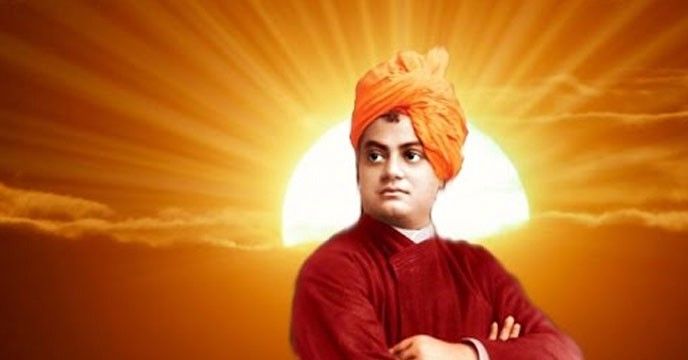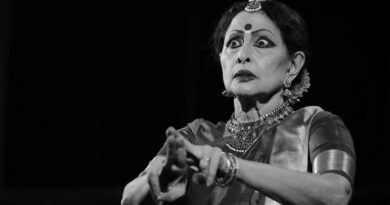The Empowering Monk of India : Swamy Vivekananda
‘If you want to know India, study Swami Vivekananda’- Ravindranath Tagore
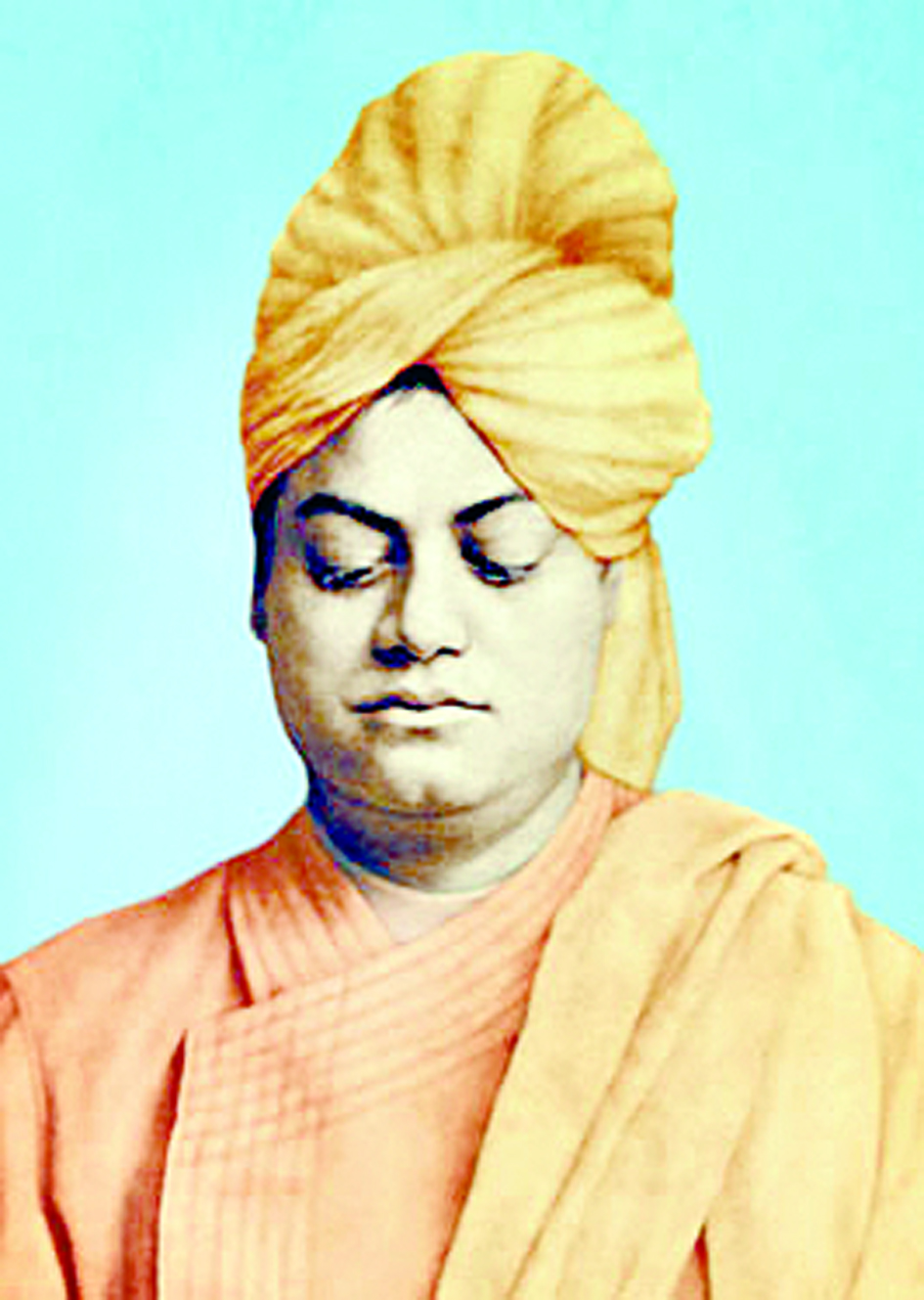
A prolific thinker, great orator, passionate patriot, Hindu monk and one of the most celebrated spiritual leaders with a commanding intellect and power of India, Swami Vivekananda crammed immense labor and achievement into his short life, 1863-1902. Bright and full of energy as a child, his mother found him hyperactive and hard to control. Though not an adamant boy throughout, he developed fascination and curiosity for the wandering monks of India and their saintly lives. Born with a yogic temperament, he practiced meditation ever since his boyhood, and was associated with Brahmo Movement for a while. At the threshold of youth, shaping his personality, he attained the free-thinking philosophy of his Guru Ramakrishna Paramahamsa advancing his life into a new paradigm. His speech at the World Parliament of Religions still stands as the impeccable speech ever made by an Indian, introducing him to the world’s culture.
Vivekananda’s Contributions to the World’s Culture:
Making an objective assessment of Swami Vivekananda’s contribution to the world of culture, his main contributions to the modern world are mentioned below:
Understanding of Religion:
Swami Vivekananda emphasized to the modern world that religion it is a universal experience of transcendent reality, common to all humanity. Swami met the challenge of modern science by showing that religion is as scientific as science itself; religion is the ‘science of consciousnesses’. Religion and science are not contradictory to each other but are complementary. He said that our universe is held in the hands of superstitions, dogmatism, priest crafts and intolerance. Everyone has to free oneself from all evils and have to search for supreme freedom, knowledge, and happiness.
View of Man:
Vivekananda’s concept of ‘potential divinity of the soul’ gives a new, ennobling concept of man. The current age is the age of humanism which holds the man to be chief concern and centre of all activities and thinking. Through the science and technology, man has attained greater success and power, and modern methods of communication and has traveled through transfer of the human society into a ‘global village’.
The degradation of man has been increasing rapidly as a result of huge increase in broken homes, immorality, violence and crime. Vivekanada’s concept of potential divinity of the soul prevents this degradation; divinizes human relationships, and makes life meaningful and worth living. Swamiji has laid the foundation for ‘spiritual humanism’, which is manifesting itself through several neo-humanistic movements and the current interest in meditation, Zen etc all over the world.
Principle of Morality and Ethics:
The prevalent morality, in both individual and social life, where every human life is based on fear of public, God’s punishment, Karma, and so on. The current theories of ethics also do not explain why a person should be good to others.
Vivekananda has given a new theory of ethics and new principle of morality based on the intrinsic purity of our real nature, our true divine self of Atman. Similarly, we should love and serve our neighbors, because we all are one in the ‘Supreme Spirit’ known as Paramatma of Brahma.
Bridge between the East and the West:
Another great contribution of Swami Vivekananda did, was to build a bridge between Indian Culture and western culture. He did it by interpreting Hindu Scriptures, philosophy and their way of life and institution to the western people in an idiom which they could understand. He made the western people realize that they have to more to grasp from Indian Spirituality for their own well- being.
He showed that regardless of her economic situation and backwardness, India had a great contribution to make to world culture. In this way, he was instrumental in ending India’s cultural isolation from the rest of the world. He was India’s first great cultural ambassador to the west.
On the other hand, Swamiji’s interpretation of ancient Hindu scriptures, philosophy, and institution prepared the mind of Indians to accept and apply the two best elements of western culture, namely science and technology and humanism in practical life. He has taught Indians how to develop spiritually and familiarize oneself to the western humanism, especially the concept of individual freedom, social equality, social justice and respect for women in Indian ethos.
Swami Vivekananda’s Concept of Education
Swami Nityayogananda
Ramakrishna Mission Ashram
Visakhapatnam
INTRODUCTION:
The human race has come a long way since their first appearance on this planet. It has passed through different phases for thousands of years, and today it stands out unique among all other living beings of the world. The development, from the man living in the caves and hunting wild animals for his food, to the man leaving his footprint on the moon and orbiting the planet, is simply remarkable and astonishing.

We now live in the highly sophisticated and advanced scientific age. Scientific discoveries and technological progress are growing in huge proportion. This in turn is bringing about radical changes in the life style everywhere, in the East as well as in the West. Our eyes are dazzled as it were by the glamour of the extravagant pomp of the scientific discoveries and its application. It is getting on our nerves and we are swept away by that influence of scientific glory, and as a result we are pushing every basic thing to mere a secondary level. This progress in the magnificent scientific fields which increases our creature comfort is precisely what we call civilization in modern terminology. But one thing we must remember, these scientific marvels with its awe-inspiring technology, if not handled with proper measure and control, can easily turn against us and destroy us from our root, as we see it happening in our lives today. There are so much of achievements in the external fields for last four hundred years.
We live in a cyber age now where science is evolving exponentially, sometimes even beyond our imaginations. There is no doubt that these innovations in the external world are conquering the external nature which is necessary for our human growth. Without these achievements in the external fields, human progress will come to a standstill and the result will be the stagnation and decay. The study of the external world and thereby unlocking the secrets of the nature is undoubtedly grand. But yet grander, vaster and more majestic and more important is the study of the world within, the study of observer himself.
The study of this internal world along with its external counterpart will complete our education in totality. But to our great dismay, we neglect altogether the study of the internal world while paying our whole attention only onto the external fields, and as a result all sorts of moral degradations are invading the society and creating uncontrollable disaster today.
Knowledge gives us tremendous power and wealth. We are much more powerful today than the primitive men of the past, for we have much more knowledge today than the primitive men living in the caves and forests. The primitive men were almost totally under the control of the forces of the nature. But as science advanced, we could control the natural forces and use them as we wanted; we human beings are the only creatures who can say “no” to the nature. We can extract huge wealth from the nature for our use. But if we don’t know how to handle this wealth and the power we possess, the same wealth and power will destroy us. And then, we became another kind of primitive men controlled by the internal nature, and that is what we are today. As the great commentator Sri Shankaracharya puts it while writing the commentary on the Taittiriya Upanishad.
“The wealth that is acquired without acquiring the pure wisdom only destroys the possessor.” [1]
It is discussed in Upanishads, “how the teacher is imparting the teachings to the student, first to purify the intellect and develop the wisdom and then handle the power and wealth so that those powers and wealth will never be misused.” Therefore, we must have the wisdom and subtle growth to deal with the external wealth. This wisdom of handling power and wealth for the good of all comes from the education pertaining to the internal world, which alone is the source of all values and ethics.
Swami Vivekananda in his inimitable way expressed the idea of the character making again and again and it is superfluous to mention, that he traced back the root of the man-making education to our sages and the Vedanta. He taught this vedantic concept of education in more forcible modern language to the modern world. He clearly foresaw the defect of the modern system of education. He exhorts:
“The education that you are getting now has some good points, but it has a tremendous disadvantage which is so great that the good things are weighed down…Education is not the amount of information that is put into your brain and runs riot there, undigested, all your life. We must have life – building, man – making, character – making assimilation of ideas.” [2]
The Secular Education: Advantages and Disadvantages
The secular education we receive today gives a beautiful sense of dignity and the individual worth to the student. A village child goes to school with fear and hesitation in his mind. He bears no faith in himself, but within a few days in the school a change comes; he develops the faith in himself, he develops the idea in himself that he is free and he is somebody independent.
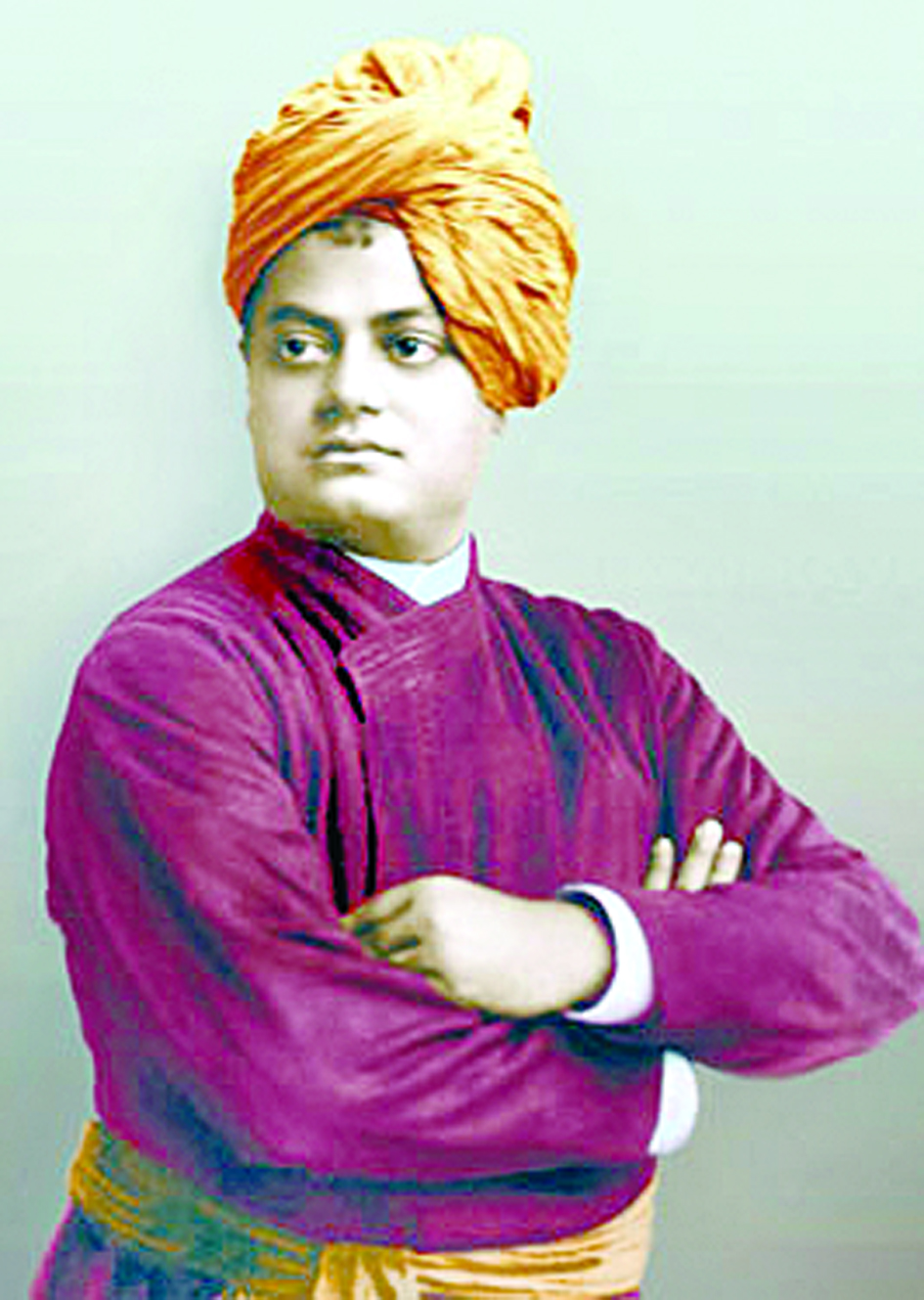
A sense of individual worth comes to the child through this education. When he gets higher degrees like Bachelors, Masters and so on, this sense of dignity, freedom and the individual worth grow stronger in him, the more the secular education the stronger this sense grows. This is very much important for our growth, to have more confidence. This system is excellent and we are having it today in plenty in every country. It is a great blessing on us today. But that is not enough. That individual must develop the sense of responsibility simultaneously.
We have not understood well nor have we assimilated this second value, the sense of responsibility. It is on this that our real progress and development rest. The more we develop this sense of responsibility the greater will be our progress. We may get a very high secular education, a Master’s degree or a Ph.D or a Post Doctorate, that will definitely be the asset to an individual and of the country, but that secular education will remain always within the frame of an individual being, will never come out of his narrow organic system for the social benefit unless we have grown enough to have some sense of responsibility.
We have plenty of resources, plenty of brain power in India; we should have gone much higher than many of the developed countries abroad. But we are not progressing as the countries like Japan or other European countries do because we lack that one quality which is the sense of responsibility, that psychic development. Our heart is to be expanded. We must feel concerned for others. We must get out of selfishness, self-centeredness and other pettiness. Right from the dawn of the modern civilization, i.e. from the eighteenth century or so, we in India never practiced unselfishness; never practiced the concerned for others, the millions of mass were neglected as they are neglected even today.
We practiced the horrible untouchability for centuries together, and even today these kind of moral degradations are being practiced around us. The result is that in spite of having all the resources in our country, our progress came to a halt. Neither have we grown as individuals nor as collective. We have all the resources, but we lack the character resource. We spend crores of rupees but only fraction reaches the people. We may exhaust all our available resources, but without the character resource nothing will come to our help, everything will be a colossal waste. That is what we see today- corruption of every form, from top to bottom. It will neither benefit an individual nor the collective.
THE CHARACTER-MAKING EDUCATION: LOOKING INSIDE
This psychic maturity in character development is the crying need today. And this character resource, according to Swamiji, comes from the training of the internal instruments, namely the mind, the intellect etc. He says:
“To me the very essence of education is concentration of mind, not the collection of facts. If I had to do my education once again, I would not study facts at all. I would develop the power of concentration and detachment, and then with a perfect instrument, collect facts at will.” [3]
Therefore by the Education of the internal, by disseminating the moral values and ethics alone we can bring about a significant change in us as individuals and also as collective. The mere brain power is not enough at all. It can be our greatest enemy if we don’t educate ourselves to use this power in a proper way. The intellectual development alone cannot constitute the human development. In the higher education that we receive today we develop a very fine brain power. We get tremendous intellectual capacity.
This secular education can very well be an excellent vehicle to disseminate the values and the ethics. Through the higher education the intellect becomes sharp and expanded and therefore becomes the fittest instrument to grasp the finer truths lying within us. It is not possible for a dull and confused intellect to understand the profundity and power of this internal truth. We must work out on this line today – combining the external and the internal Education.
But in the present days, even after understanding all the shortcomings of this one-sided intellectual development, we glue ourselves to only secular education what we receive in the schools and universities ignoring altogether the internal development. Even though we know this fact from decades and also from the teachings of the great thinkers, we refuse to implement it in our practical lives. This implementation in the true sense of the term is the real need of today. We have heard enough, we have talked enough; we must now practice. Because It is only and only the Practice that makes a man perfect.
This erosion of values is perceived everywhere due to this negligence, and today we have come almost at the bottom level of that erosion. We are now face to face with the serious problems, the most serious of which is the corruption. We are experiencing a serious moral and ethical degradation which in turn consumes the very vitals of the individual and of the social structure. We are dictated by such a system which tells us to become more and more ego-centric and selfish, and thus giving birth to every form of evil and chaos in the society. This is the prevailing atmosphere today; an atmosphere of moral and spiritual decay, with political and intellectual domination all around. The secular education that we are getting today cannot solve this problem. We need a different kind of Education along with the conventional one, taught by the great thinkers – the education to train and regulate the internal functions, namely the mind. The great Western thinker and Nobel laurite Bertrand Russell remarked:
“What stands in the way? Not physical or technical obstacles, but only the evil passions in human minds: suspicion, fear, lust for power, hatred, intolerance” [4]
Now to eradicate all these ‘evil passions’ from human minds, we clearly understand that the Education we are receiving now is not enough. In fact, it is this kind of one-sided education that gives birth to endless evils. Swami Vivekananda emphasized this need again and again. It is not simply a gathering of information from various sources and thereby making a person mere machine. Swamiji clarifies:
“If you have assimilated five ideas and made them your life and character, you have more education than any man who has got by heart a whole library.” [5]
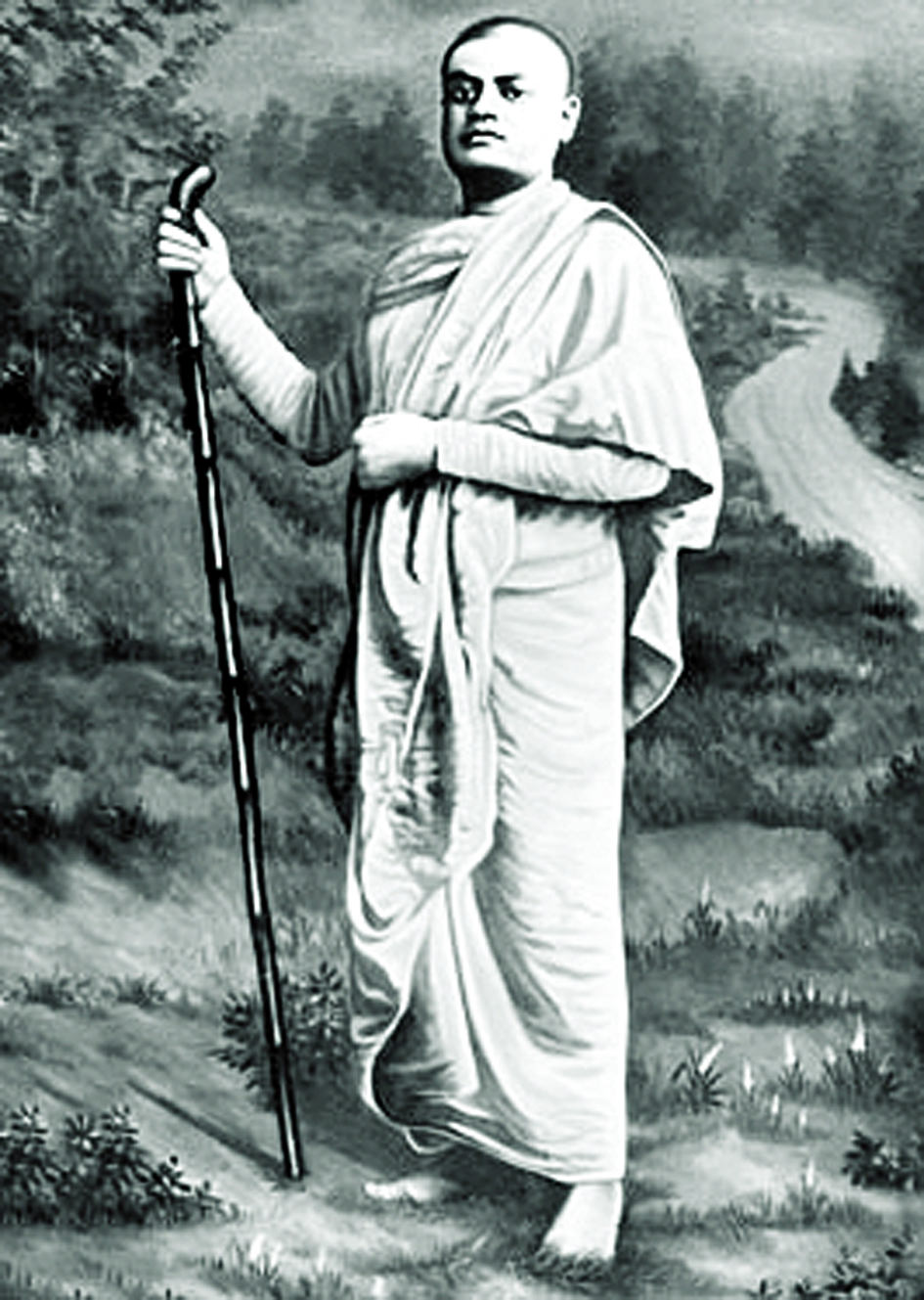
So the object of the ideal system of education, according to Swamiji, is not merely the advancement of theoretical knowledge in various fields but also the advancement of life, development of the highest powers and capacities, and enfoldment of the noblest potentialities of the student. An individual must be enabled at the same time to apply to his own life all the ideas that he has learnt and gathered and in turn promote his growth – physically, intellectually, morally and above all spiritually. This system of education will bring out the inner perfection of an individual. It is needless to say that only a pure and alert mind has the acumen to grasp instantaneously the instructions – secular and spiritual. The ancient Indians with their incomparable knowledge of practical psychology laid proper stress on the prerequisites of an ideal student hood. They had, of course, spiritual realization as the highest goal of life and made all secular knowledge subservient to it. But the path they prescribed for the attainment of knowledge holds equally good for receiving both types, namely secular as well as spiritual.
This is the real education that Swami Vivekananda wanted us to imbibe, the real education that will give us a healthy material prosperity and a sound spiritual growth. This is the real need of today’s scorching world, and we have to move forward taking this education as the prime support- this man-making Education. In the words of Swamiji :
“Men, men, these are wanted: everything else will be ready, but strong, vigorous, believing young men, sincere to the backbone, are wanted. A hundred such and the world become revolutionized. The will is stronger than anything else. Everything must go down before the will, for that comes from God and God Himself; a pure and a strong will is omnipotent…” [6]
Another great thinker and a Nobel laureate of Rabindranath Tagore, defines higher education as:
“The highest education is that which does not merely give us information but makes our life in harmony with all existence.”[7]
Many such great modern thinkers in the human history like Herbert Spencer, Mahatma Gandhi etc., have emphasized again and again this point to give a solution to the modern day problems. Therefore we must wake up. We must disseminate the values and moralities to the next generation to save our society from utter ruin. Sooner we do the better for all of us. The Western nations, known to be the materialistic nations, also are undertaking an extensive research work on this subject currently. Even they agree with the fact that mere secular education is not enough. A recent research conducted in the National Academy of Sciences, USA revealed this startling fact and opened the eyes of the West. They undertook the research work as to how would be the effect of practicing self control right from the childhood. Following is a part of their proceedings:
“The program trains children to resist temptations and distractions and to practice tasks designed to enhance working memory and flexible thinking… These techniques are potentially so powerful that in centers of higher learning, economists now contemplate public policy measures to improve self control as a way to “enhance the physical and financial health of the population and reduce the rate of crime ‘, remark the authors of the study that appeared in the February (2011) Proceedings of The National Academy of Sciences (PNAS).” [8]
The UNESCO also re-thought the definition of Education. The twenty first century definition of Education given by UNESCO is LEARNING: THE TREASURE WITHIN. They further elaborate:
“There is, therefore, every reason to place renewed emphasis on the moral and cultural dimensions of education, enabling each person to grasp the individuality of other people and to understand the world’s erratic progression towards a certain unity; but this process must begin with self-understanding through an inner voyage whose milestones are knowledge, meditation and the practice of self-criticism.” [9]
OWNERSHIP VERSAS TRUSTEESHIP – UNDERSTANDING ‘NEED’ AND ‘WANT’
When the students grow through the higher secular education the sense of individuality in them grows stronger as well. They become more and more tied down to their tiny organic system; the body-mind complex, and as a result they try to nurture their ego and selfishness all the time. Every action they perform is then guided by that motive force of self-centeredness. Gradually in this process the ownership enters in them. They want to consume the things of the world only for themselves even at the cost of anything in this world. The greed for acquiring everything in this world enters into them even without their knowledge. They begin their lives with needs and slowly the needs of their lives change into wants. This attitude of ‘want’ is the root cause of all the evils and degradation today that we see around us. This ownership in turn grows more and more strongly and they want to possess everything in this world. The desire for wealth, for name and for fame keeps on increasing endlessly. This attitude of ownership must be stopped in order to save the society from the disaster, and in that place the Trusteeship should be brought in. We must demarcate between our needs and our wants. The desire can never be fulfilled by satisfying our desires. It is like trying to put out the fire by pouring butter into it. We learn from Srimad Bhagavatam, the great king Yayati remarked after he enjoyed the sense objects to the maximum possible extent:
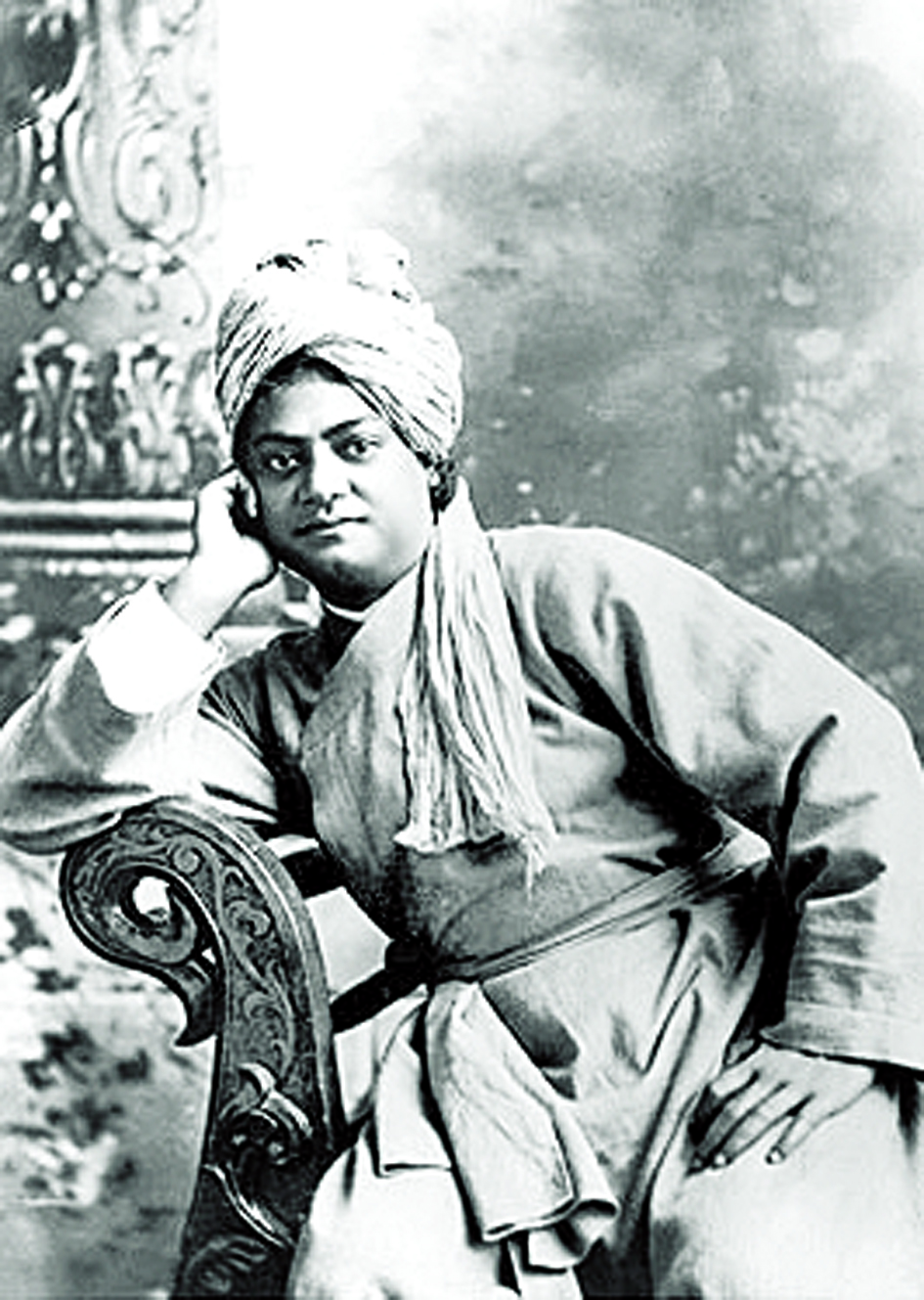
“Desire can never be calmed by enjoyment of the objects of desire. Rather it becomes stronger, just as does the fire by adding ghee to it.”[10]
Therefore the concept of ownership must be replaced by the concept of trusteeship. Through the trusteeship the selfishness goes away and all round development takes place; a beautiful healthy growth comes in and we naturally feel for others. We feel that others grow too along with us and the result is wonderful individual and collective development. This is the need of today. This concept of trusteeship comes through the right kind of education taught by Swami Vivekananda
Swami wanted this idea of trusteeship to be implemented in every field of productive work. When Jamsetdji Tata and Swami Vivekananda met in a voyage, Swamiji suggested this concept to Jamsetdji to be implemented; Jamsetdji implemented it in his Tata Group of which he is the founder.
However this feeling of Trusteeship doesn’t come to one who has only secular higher education devoid of moral and ethical training. On the contrary the students trained only in the secular education, quickly develops the idea of corporate. They tend to become a part of a corporate body or they themselves want to create a corporate body of their own. Whereas the sense of fellow-feeling, unselfishness become natural traits to one who has education both in secular level and in the character level. The students of this second class are more productive and beneficial for the society.
By practicing the idea of trusteeship we will steadily learn that we actually own nothing in this world. To put it in another way, we will learn that we are the trustees, the care takers of the resources of the world, and which will be gently handed over to our next generations, and we all, as per our maximum capacity, will put our shoulders to the wheel for a better and higher growth of humanity. This is what is to be taught everywhere, if we want to live our life peacefully and want to hand over a glorious society to our next generation. The concept of corporate bodies, which is a very prevailing concept today, is exactly opposed to the idea of Trusteeship. And the result of it is very much palpable everywhere. The first product of it is the no feeling of concern for others – the incalculable cruelty and blood-sucking tendencies.
EDUCATION OF THE MASSES
To have a healthy and balanced development we must pay attention to the education of the common masses. It is an important trait of Swamiji had extraordinary concern for the poor and the downtrodden masses of our motherland. He always emphasized that the masses must be raised and proper education must be imparted to them. In fact this was the mission of his whole life. In several occasions he forcefully asked us to serve them, educate them and thereby uplift them. He said:
“…my heart ached to think of what we think of the poor, the low, in India. They have no chance, no escape, no way to climb up…They sink lower and lower every day, they feel the blows showered upon them by a cruel society, and they do not know whence the blow comes.”[11]
He further says:
“The chief cause of India’s ruin has been the monopolizing of the whole education and intelligence of the land, by dint of pride and royal authority, among a handful of men. If we are to rise again, we shall have to do it in the same way, i.e. by spreading education among the masses.”[12]
“So long as the millions live in hunger and ignorance, I hold every man a traitor who, having been educated at their expense pays not the least heed to them!”[13]
PREPAREDNESS FOR HIGHER VALUES
Therefore this is the type of education we must stress upon individually as well as collectively. And to get this education we need to prepare the foundation. The preparation comes from the discipline of the mind through renunciation and dispassion. The teacher must see whether the student is fit to receive this kind of education, whether the student has sufficient purification, and then impart these values and ethics on them. In case the students lack the required qualifications to receive, the teacher must make the students fit enough to receive the instruction. We find in the Katha Upanishad that the God of Death Yama, before imparting the highest knowledge tests the student Nachiketa of his qualifications, and when the teacher Yama is satisfied with Nachiketa’s renunciation and dispassion he starts disseminating the knowledge to Nachiketa. Moreover the student must come to the teacher with a sense of humility and the attitude of service. As the Bhagavad Gita puts it:
“Know that by prostrating yourself, by questioning, and by service; the wise, those who have attained the Truth, will instruct you.” [14]
If the knowledge is given without this preparedness, it will not be received by the receiving end and the knowledge will go in vain. And it will remain always in the pages of the books as mere theoretical jargon.
In the same way the teacher also must possess certain qualities to disseminate such values and ethics to the students, to make a better and peaceful society. Mere theoretical instructions will not have any impact in such cases. These values must be disseminated by the teachers who in the first place have practiced in their own lives, and realized in their hearts of its true import. Secondly they must be capable enough to come down to the level of the students, to understand the student’s position clearly and then impart the values to them. This way the dissemination will be smooth and effective. A word of warning is sounded in the Katha Upanishad in case the teacher does not elevate himself to the higher level of morality and ethics and yet makes an attempt to teach the students.
“Remaining within the fold of ignorance and thinking that they are learned and wise, the deluded ones are buffeted, like the blind leading blind.”[15]
CONCLUSION:
It is therefore absolutely necessary in today’s context to put the ideas of Swami Vivekananda into practice. Both the teacher and the taught are required to understand the importance of the moral values and ethical standard, and then work out with diligence and steadfastness to make them our part and parcel. It is rather more important for the teachers, the real architects of the future generations, to understand its right import in the right spirit. The practice of these values will surely unfold our hidden dimensions and potentials which are actually based on the spiritual bedrock. We will slowly learn that though we appear to be a tiny organic system with puny body-mind complex we have infinite dimensions lurking inside, hidden as it were under the veil of finite.
We will uncover the veils by the practice of these morals and ethical values. We will transform ourselves from narrow finite individuals to a limitless infinite person by transcending our organic system, by uncovering our higher dimensions. That is our real goal of the life, and that is how we transform all the values we practice to a higher spiritual dimension. That is how we will evolve – from animal-man to man, and from man to God. God must we become. This is what Swamiji precisely teaches us. And this is what the Vedanta asks us to do. We must find that dimension in us which is divine; and thus by the dint of that divinity all pettiness and weakness will vanish in no thin air “Let the lion of Vedanta roar and the foxes will fly to their holes.”[16] , as framed by great sage Swami Vivekananda.
Finally, when we are established in this Vedantic Truth we will never take a false step, we will never be shaken by anything in this world. From us will always emanate the good wishes for the world at large.
In our ancient society, these ethical and moral values were very naturally practiced by almost everybody. The men with demoniac propensities were very few. Even the evil persons of the then society used to maintain some higher standards of values which we utterly lack today. We must not forget that the blood of the Upanishad times sages is flowing in our body. We are the descendants of those sages who could shake off all weaknesses and negative traits effortlessly, bring all their tendencies under their will power and work incessantly for the good of one and all. The result was a wonderful, healthy society. We must get that state back again, nay, we must be much more than they could achieve. The same ancient teachings are once again preached by the prophet of the modern age Swami Vivekananda. Let us join hands, work together to raise all of us to the higher spiritual plane. Every being in the world has the birth right to it. Let us rise beyond the ideas of caste, creed, sex and religion, and go forward with a glorious mission. Sooner or later we must conquer our all weakness and rise above the nature – internal as well as external, for we are infinity whereas the nature is finite.
Swami Vivekananda: The clairvoyant culturist of the World
Text By: B.Satyanarayana Raju
Additional Commissioner of Income Tax
Mumbai.
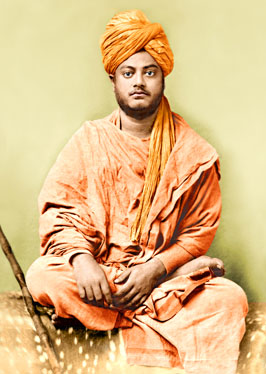
According to Swami Vivekananda, culture can be broadly defined as art and other collectively regarded manifestations of human intellectual achievement and the ideas, customs, and social behaviour of a particular people or society. Swami Vivekananda has opined that there is unity in diversity within the Indian culture. He believed that every civilization or culture has a particular life-centre, a dominant characteristic or trend. In his view, the life-centre of Indian culture is spirituality, which is a way of life oriented to the ultimate purpose or goal of life, which is the realization of the supreme spirit or God. Though he emphasised the spiritual aspect of culture, he equally extolled the art especially Buddhist art, paintings, and sculptures. Swami Vivekananda was also a good singer and always admired the Indian music and dance. Swami Vivekananda advocated that spirituality should be manifested in all aspects of life and culture, which would help in the overall development of an individual. Swami Vivekananda quoted about India and its culture as “The land, where humanity has attained its highest towards gentleness, generosity, purity, calmness, above all the land of introspection and spirituality” .The national ideals of India are renunciation and service which strengthened, will protect the country forever.” Swami Vivekananda also emphasized that, it’s only spirituality which will bring transformation in human race. He quoted that,
“No amount of force, or government, or legislative cruelty will change the conditions of a race, but it is spiritual culture and ethical culture alone that can change wrong racial tendencies for the better”.
He appealed to the people of the country “ In our life, blood is spirituality. If it flows clear, if it flows strong and pure and vigorous. Everything is right; politically, socially, any other materialstic defects, even the poverty of the land, will be cured, if the blood is pure”.
Indian civilization is more than ten thousand years old, which produced a unique type of highly advanced and synthesised culture. In spite of the innumerable regional, social and linguistic diversities of the country, there has always been a basic unity in Indian culture. Moreover, this culture maintained steady continuity from Vedic times to the present day, in spite of countless wars within the country, invasions from outside and two centuries of subjugation by the British. This indestructible unity and steady continuity of Indian culture are derived from its deep spiritual foundations.
Indian spirituality is deeply rooted in the ancient philosophical and religious traditions of the land. Philosophy arose in India as a query into the mystery of life and existence similar to the situation in ancient Greece. But, as Swami Vivekananda pointed out, the Greek philosophers confined their enquiries to the external world, and the method they employed was only speculation, whereas in India philosophical enquiries were carried out in the inner world. Indian sages called as the ‘Rushis’ or ‘seers’ developed special techniques of transcending the senses and the ordinary mind, collectively called Yoga. With the help of these techniques, they delved deep into the depths of consciousness and discovered important truths about the true nature of man and the universe.
The sages found that man’s true nature is not the body or the mind, which are ever changing and perishable, but the spirit which is unchanging, immortal, pure consciousness. They called it the Atman. The Atman is man’s true self, the true knower, the true source of man’s knowledge, happiness and power.
The sages further found that all individual selves are parts of infinite consciousness which they called Brahman. Brahman is the ultimate reality, the ultimate cause of the universe. Ignorance of man’s true nature is the main cause of human suffering and bondage.
By gaining correct knowledge of Atman and Brahman, it is possible to become free from suffering and bondage and attain a state of immortality, everlasting peace and fulfilment known as Mukti. Religion in ancient India meant a way of life, which enabled man to realize his true nature and attain Mukti.
Consequently, philosophy provided a correct view of reality, while religion showed the correct way of life; philosophy provided the vision, while religion brought about the fulfilment; philosophy was the theory, and religion was the practice. Thus in ancient India, philosophy and religion complemented each other where, they together constituted a single endeavour and an integral discipline. This integral religious philosophy or philosophical religion was called Vedanta. The term Vedanta comes from the fact that its basic principles constitute the last part or culmination of the ancient scriptures known as the Vedas.
The Vedas are the oldest and most authoritative scriptures of Hinduism and all other scriptures are subordinate to them. They were not composed by anybody; but were ‘revealed’ to the Rushis. Thus, they are also called ‘Shruti’, ‘that which is heard’. The earlier part of the Vedas may have been composed between 2000 B.C. and 1000 B.C.
There are four Vedas: Rig-veda, Yajur-veda, Sama-veda and Atharva-veda. Each of these has four divisions: Samhita, Brahmana, Aranyaka and Upanishads.
- Samhita: This section is a collection of hymns addressed to various deities. Many of these hymns have deep mystical significance.
- Brahmana: This portion deals with various rituals and also with moral principles.
- Aranyaka: This portion contains various meditations. Some of these meditations are mental recreations of external rituals.
- Upanishads: These are the records of the transcendental experiences gained by Rushis by following different contemplative techniques. These experiences are actually revelations about Atman, Brahman and other eternal, universal truths regarding the ultimate reality.
These eternal truths and principles of the spiritual world, lying scattered in the Upanishads, were brought together and codified by Badarayana in the form of sutras or aphorisms in the 5th century B.C. These sutras known as Brahma Sutras form the foundation of the system of philosophy known as Vedanta-Darshana.
The Vedanta
The term Vedanta stands for three inter-related things which are listed below:
- The Upanishads collectively, which form the last and the most important part of the Vedas;
- The eternal truths and principles of the spiritual realm;
- The system of philosophy based on Brahma Sutras.
However, it is collectively in the last sense of Vedanta Darshana (Vedanta Philosophy), that the term Vedanta is commonly used. In relation to this, it should be pointed out that five more systems of philosophy arose in India in the early centuries of the Christian era. They are:
- Mimamsa, founded by Jaimini
- Vaisheshika, founded by Kanada
- Nyaya, founded by Gautama
- Sankhya, founded by Kapila
- Yoga, founded by Patanjali
These five systems of philosophy always remained confined to small groups of intellectuals and were never identified with the mainstream religion of the land, and in due course, they ceased to be in vogue. Vedanta alone remained the main philosophy of India from the Vedic period, and Vedanta only got identified with the religion of the land, as both philosophy and religion. This combined religious and philosophical tradition of India came to be called ‘Sanatana Dharma’, meaning the ‘Eternal Religion’ and, later was named as Hinduism.
Other scriptures of Vedanta
Although the Upanishads constitute the original and most authoritative source of Vedanta, they are not the only scripture of Vedanta. Several other books were accepted as authoritative sources. Among these, the most important one is Bhagavad Gita, which introduced several new concepts into Vedanta, such as God incarnating himself as the Avatar age after age, devotion to personal God as means to Mukti, discharging one’s duties of life in a spirit of selflessness and self-surrender to God as a spiritual path. Over the centuries, great teachers like Shankara, Ramanuja, and great saints of medieval period enriched Vedanta with philosophical concepts and devotional songs.
The three phases of Vedanta
Vedanta is not a static philosophy or religion, but it is a highly dynamic, ever-growing philosophy and religion, capable of meeting challenges and overcoming obstacles. In this process of growth, Vedanta has passed through three phases. They are:
(i) Formative Phase: This phase extended from around 1000 B.C. to 3rd century B.C. During this period the Upanishads, the Gita and the Brahma-sutras (these three scriptures are together called Prasthana-traya) provided the basic concepts of Vedanta such as Atman and Brahman.
(ii) Scholastic Phase: This phase extended from about the 8th century A.D. to the 13th century. During this period, great teachers like Shankara expounded and expanded the original intuitive insights of Vedic Rushis and the teachings of the Gita, and established Vedanta as a cogent, comprehensive system of philosophy – the most cogent and comprehensive religious philosophy the world has ever seen.
But during this period, Vedanta split into a number of philosophical schools and religious sects. The main philosophical schools were the following:
- Advaita or Non-dualism propounded by Shankara
- Vishishta-advaita propounded by Ramanuja
- Dvaita propounded by Madhva
- Shuddhadvaita propounded by Vallabha
- Achintya-bheda-abheda propounded by Jiva Gosvamin
These schools of philosophy carried on acrimonious debates among themselves, which kept up the intellectual vigour of the people. During this period, India produced many great scholars and thinkers.
The main religious sects were: Vaishnavism, Shaivism and Shaktism. Each of these had several sub-sects. These sects produced many saints who spread Vedantic ideas among the common people through songs and teachings.
Also, two other religion-philosophical traditions associated with Indian culture, namely Buddhism and Jainism, which arose as spiritual movements in the 6th century BC. They shared some of the basic concepts of India’s ancient belief system such as karma, re-birth, samsara, dharma and direct spiritual experience. But their rejection of the authority of the Veda, caste distinction, belief in an ultimate reality as the supreme deity and ultimate cause of the universe, and other principles alienated them from the main stream of Vedantic culture. As a result, Buddhism and Jainism faded away in India and after the 12th century AD. Later, Budddhism ceased to have any direct influence on the development of Indian culture.
(iii) Modern Phase: The third phase of Vedanta was inaugurated by Sri Ramakrishna and Swami Vivekananda in the 19th century. During this period, Vedanta was transformed from an ethnic religious philosophy into a universal philosophy of life.
Thus, Swami Vivekananda cautioned the entire nation in his own words, that ‘if we neglect our culture, the result will be very dangerous’. He also stated that,
“But mark you, if you give up that spirituality, leaving it aside to go after the material civilisation of the west, the result will be that in three generations, you will be an extinct race; because the backbone of the nation will be broken, the foundation upon which the national edifice has been built will be undermined, and the result will be annihilation all around”.

